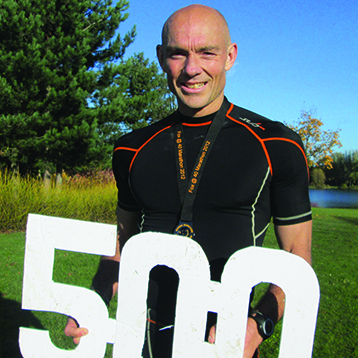For many of us, once we cross that marathon finishing line, our race is well and truly run.
At that moment, nothing in the world would induce us to run another step, never mind several more miles. And with a finisher’s medal around our neck, we’ll plan a few well-earned weeks off before even thinking about future challenges.
But in recent years, explorer Sir Ranulph Fiennes, comedian Eddie Izzard and a whole host of lesser-known endurance runners have raised the bar. For these guys, once just isn’t enough.
Steve Edwards
Back in 1981, when he saw a poster advertising the now defunct Coventry Marathon, Steve thought it might be something a bit different to do on a Sunday morning. More than 32 years later, he’s a world record holder after completing the most marathons in sub-3:30 times. By the start of this autumn, he’d chalked up a staggering 600 marathons, without the slightest sign of slowing down.
“On average I run a marathon every fortnight,” says Edwards, now 51.
“After completing Coventry four times in the early 80s, I started doing more and more marathons. In 1992 I smashed the world record by running 87 official marathons within 12 months.” For the non-mathematicians among us, that’s a marathon every four and a bit days, for an entire year.
His racing streak has taken him to 35 countries plus 60 different counties in the British Isles.
“I didn’t want to just do the quantity but uphold the quality too,” says Edwards. “So I always finish inside 3:30 and stopping simply isn’t an option. I’d crawl over the finish line if I had to, to avoid getting a DNF against my name.”
His impressive record has demanded a phenomenal amount of dedication.
“I’ve always thought that 26.2 miles is such a long way, and that a lot can go wrong while doing it. So I prepare really well, pay careful attention to my training, nutrition and hydration, and always stay positive about the race.
“Every week I run between 50-70 miles, and have one ‘easy day’ of running 3-4 miles with workmates. I cycle 60 miles a week and do lots of core strengthening and stretching. It works out at two hours a day.”
Dr Andrew Murray
Murray is another man who can bash out a marathon on any given day, anywhere in the world.
“I got into running when I was casually jogging in places I was visiting about six years ago,” says Murray, 33, from Aberdeen. “The first race I did was the Everest Marathon, after I bumped into some guys training for it. It sounded a reasonable idea so I did it too.”
Two years ago he ran 2,659 miles in 78 days – the equivalent of more than 100 full marathons – from John O’Groats to the Sahara desert.
“Running has been my way of seeing the world. I’ve done races in the North Pole, Antarctica, jungles and deserts. I’ve just come back from Mount Kilimanjaro.”
As a GP and the Scottish government’s physical activity champion, Murray is keen to show he doesn’t possess superhero qualities – just determination in abundance.
“For me, running has always been about having a clear focus of what I want to do. You also have to recognise that bad things will happen and it’s all about keeping a clear head. You have to think of a solution rather than worry about the problem.”
Although he admits he’s never done a race yet when at some point he hasn’t wanted to stop, he strongly believes most places on earth can be conquered in a pair of running trainers.
“Ultra marathons and multiple marathons used to be thought of as extreme but they really aren’t. It’s a good test of your endurance and an achievement to do it, but they’re completely possible for anyone who sets their mind to it.
“Just choose races you want to do and apply the basics of the right training, nutrition, treatment of any injuries, etc. and go for it.
“I’m very much of the thinking that running doesn’t destroy your body; the opposite is true. The more you do, the more your body will be able to do.”
Multi-marathon checklist
Ensure your multi-marathon challenge goes swimmingly by following these fundamental rules:
- Think about getting your biomechanics checked out by a podiatrist or physio before you step up. With increased mileage, any significant imbalance could flare up as a serious injury.
- Pay even greater attention to nutrition and hydration as your body will have much less time to re-balance between races.
- You’re going to need to stay motivated like never before. Find some personal verbal ‘cues’ you can repeat to yourself during the miles to remind yourself why you’re doing it.
- After a run, get some quality protein and fluids inside you ASAP. Also factor in time for a big carb-heavy meal to set you up for the next day’s effort.
- Even if time is short between races, recover ‘smart’. Consider having an ice bath, a sports massage, wear compression clothing and treat any injuries/blisters. Rest up and get as much sleep as you can.







